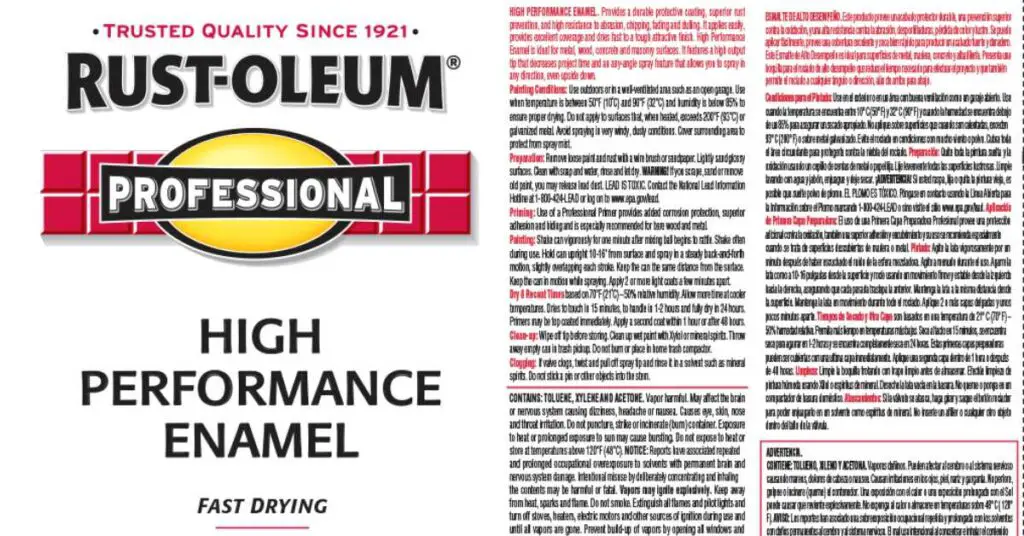Is spray paint oil or water based? Spray paint can be either oil or water-based, with each type offering distinct properties and benefits for different applications. Oil-based spray paints are known for their durability and glossy finish, while water-based spray paints offer quicker drying times, lower odor, and easier cleanup. To determine which type of spray paint you have or need for your project, check the product label for information on the primary solvent, cleanup instructions, or specific surface compatibility. Your choice between oil and water-based spray paint depends on factors such as surface material, desired finish, drying time, and environmental impact.
Hey there, fellow paint enthusiasts! If you’ve ever found yourself standing in the spray paint aisle, scratching your head and wondering, “Is spray paint oil or water-based?” – trust me, you’re not alone! It’s a common dilemma for DIYers and artists alike, and I’m here to help you navigate the colorful world of spray paints.
With so many options to choose from, it’s essential to know the difference between oil and water-based spray paints to ensure your masterpiece turns out just as you envisioned. So, let’s dive in and explore the exciting, vibrant universe of spray paint, and finally, answer that burning question!
Is spray paint oil-based?
Spray paint can be either oil-based or water-based, depending on the specific product and its intended use. The choice between oil and water-based spray paint depends on factors like surface material, drying time, desired finish, and environmental impact.
Are spray paints water-based? Some spray paints are water-based, while others are oil-based. Water-based spray paints offer faster drying times, lower odor, and easier clean-up, making them a popular choice for many projects, especially those indoors or involving porous surfaces.

What is oil-based paint?
Oil-based paint is a type of paint that utilizes oil as its primary solvent, typically containing petroleum products or synthetic resins like alkyd. These paints are known for their durability, long-lasting finish, and glossy appearance, making them suitable for projects that require a more robust coating or exposure to harsh conditions.
What surfaces can you use oil-based spray paint on?
Oil-based spray paint adheres well to nonporous surfaces such as metal, plastic, and certain types of wood with a sealed or glossy finish. The strong adhesion and durability of oil-based paints make them suitable for surfaces that may experience heavy use or exposure to the elements, like outdoor furniture, doors, and window frames.
Pros of Oil-Based Spray Paint
- Durability: Oil-based spray paints are more durable and long lasting, making them ideal for projects that require a heavy-duty finish or exposure to the elements.
- Smooth Finish: These paints generally dry to a smooth and glossy finish, perfect for surfaces that need to look polished and professional.
Cons of Oil-Based Spray Paint
- Longer Drying Time: Oil-based paints take longer to dry than water-based paints, often requiring several hours or even days before they’re fully set.
- Strong Odors: The solvents in oil-based paints emit a strong odor that can be bothersome for some people, especially in poorly ventilated areas.
- Clean-Up: Oil-based paints require paint thinner to clean up, which can be more challenging and hazardous than cleaning up water-based paints.
Is all spray paint oil-based?
No, spray paint is available in both oil-based and water-based varieties, each with its unique properties, benefits, and applications. It’s essential to choose the correct type of spray paint for your specific project to achieve the best results.
What is water-based paint?
Water-based paint, also known as acrylic or latex paint, is a type of paint that uses water as its primary solvent. These paints have gained popularity in recent years due to their more environmentally friendly nature, faster drying times, lower odor, and easier clean-up compared to oil-based paints.
What surfaces can you use water-based spray paint on?
Water-based spray paint is suitable for porous surfaces such as wood, drywall, and some types of masonry. The quick drying time and low odor make water-based paints a popular choice for indoor projects or projects involving surfaces that may expand or contract due to moisture, like exterior siding or decking.
Pros of Water-Based Spray Paints
- Quick Drying Time: Water-based paints dry much faster than oil-based paints, often in just a matter of minutes or hours.
- Low Odor: These paints emit significantly fewer odors than oil-based paints, making them more suitable for indoor projects or those sensitive to strong smells.
- Easy Clean-Up: Cleaning up after using water-based spray paint is as simple as rinsing your brushes and tools with water, making it more user-friendly.
Cons of Water-Based Spray Paints
- Less Durability: Water-based paints are generally less durable than oil-based paints and may not hold up as well to harsh weather conditions or heavy use.
- Finish: The finish of water-based spray paint is often less glossy and may require multiple coats to achieve the desired look.
Comparing Oil and Water-Based Spray Paints
When deciding whether to use oil or water-based spray paint for your project, consider the following factors:
- Surface Material: Oil-based paints adhere better to nonporous surfaces like metal and plastic, while water-based paints work well on porous surfaces such as wood or drywall.
- Drying Time: If you need quick-drying paint, water-based is the way to go. However, if you have time to spare and require a more durable finish, oil-based paint may be the better option.
- Finish: If you’re looking for a glossy, professional-looking finish, oil-based spray paint is ideal. On the other hand, if you prefer a more matte or subdued appearance, water-based paint is more suitable.
- Indoor vs. Outdoor: Water-based paints are generally better for indoor projects due to their low odor and easy clean-up. Oil-based paints are better suited for outdoor projects because of their durability and resistance to the elements.
- Environmental Impact: Water-based paints are generally more eco-friendly, with fewer volatile organic compounds (VOCs) released into the atmosphere compared to oil-based paints. If you’re concerned about the environmental impact of your project, water-based paint is the better choice.

Applications and Safety Considerations
When using either oil or water-based spray paint, it’s essential to take proper safety precautions:
- Ventilation: Work in a well-ventilated area, ideally outdoors or with open windows and doors to allow fumes to dissipate.
- Protective Equipment: Wear appropriate protective gear, such as gloves, goggles, and a mask, to avoid contact with the paint and inhalation of fumes.
- Proper Disposal: Dispose of paint cans and used materials responsibly, following local guidelines for hazardous waste disposal.
Additionally, it’s crucial to follow the manufacturer’s instructions for the specific spray paint you’re using, as there may be unique recommendations or precautions for that particular product.
Here is a list of the common spray paints separated by type:
| Oil-Based Spray Paints | Water-Based Spray Paints |
|---|---|
| Rust-Oleum Painter’s Touch | Montana GOLD Acrylic |
| Rust-Oleum Universal | Liquitex Professional Spray Paint |
| Krylon Fusion All-In-One | Montana BLACK Acrylic |
| Krylon COLORmaxx | MTN 94 |
| Valspar Project Perfect | Molotow Belton Premium |
| Seymour MRO | Molotow ONE4ALL |
| Seymour SprayTec | Ironlak |
| PlastiKote Premium Enamel | Kobra KOBRA_HP |
| PlastiKote Engine Enamel | Flame Blue |
| Dupli-Color Perfect Match | Flame Orange |
| Dupli-Color Engine Enamel | LOOP Colors |
Keep in mind that these brands may offer additional product lines or variations, so always check the label to confirm whether the specific spray paint is oil or water-based.
FAQs
Here are common questions about spray paint:
What brand of spray paint is oil-based?
Rust-Oleum and Krylon are two popular brands that produce oil-based spray paints. These brands offer a wide range of colors and finishes, making it easy to find the right product for your project.
What brand of spray paint is water-based?
Montana and Liquitex are well-known brands that manufacture water-based spray paints. These brands offer a diverse selection of colors and finishes, catering to various artistic and practical applications.
Is Krylon spray paint oil or water-based?
Krylon offers both oil and water-based spray paints in their product lineup. To determine which type you’re using, check the label or product description for information about the primary solvent, or visit the Krylon website for more information.
Is Rust-Oleum spray paint oil or water-based?
Rust-Oleum produces an extensive range of spray paints, including both oil and water-based options. To identify the type of paint you’re using, read the label or product description for information about the primary solvent, or visit the Rust-Oleum website for more details.
How do you tell if the paint is water or oil-based?
To determine if a paint is water or oil-based, first check the label or product description for information on the primary solvent. If this information isn’t available, try cleaning a test area with water; if the paint doesn’t clean up easily, it’s likely oil-based.
Another method is to check the clean-up instructions on the label: water-based paints typically require water for clean-up, while oil-based paints often need paint thinner or mineral spirits.

What kind of paint is spray paint?
Spray paint can be either oil or water-based, depending on the specific product, its formulation, and intended use. Each type of spray paint has distinct properties that cater to different applications and surface materials. When selecting a spray paint for your project, consider factors such as surface type, desired finish, drying time, and environmental impact to ensure you choose the most suitable option.
Final Thoughts 💭
To wrap it up, both oil-based and water-based spray paints have their own unique set of properties, benefits, and applications. When deciding which type of spray paint to use for your project, consider factors like the surface material, drying time, desired finish, location (indoor vs. outdoor), and environmental impact.
Always follow proper safety precautions and manufacturer instructions when working with spray paint to ensure a successful and safe project outcome.
We hope this comprehensive guide has helped you understand the differences between oil and water-based spray paints and make an informed decision for your next painting project. Happy painting!